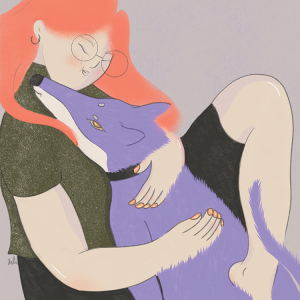So Apparently, Your Dog Might Be Able to Count
This study finds that dogs can process numbers in a similar fashion to their humans.

share article

Your pet wants you to read our newsletter. (Then give them a treat.)
My mother has two dogs: a Chihuahua and a Pug. If you think your family holidays get loud, imagine adding a pair of yappy pups to the traditional family spat. This past year, during Thanksgiving dinner, I fed them some food under the table in an attempt to win their affections (and some brief silence). I then noticed when I gave the Chihuahua two small pieces of turkey and the Pug one, the Pug hung around and stared at me. She gave me a look that roughly translated to What the hell, man? Needless to say, this only made her more disruptive.
In the following weeks, I recognized similar behavior in my own — much quieter — pup. In December, she grew increasingly excited with each sunrise. It’s almost as if she was counting the days to Christmas, when she typically gets more presents than any actual children in my life.
Now, there are a couple of possibilities in play here. Either dogs can perform basic arithmetic or I spoil mine to such a degree on holidays that I’m projecting daily excitement onto her. Thankfully, as I crawl closer toward eccentric-uncle-obsessed-with-his-dog territory, there’s evidence to support both options.
It turns out, dogs do understand numbers.
Specifically, one2019 studyopens in a new tab found that dogs can naturally count and process numbers like their humans do. To determine the presence of this ability, researchers at Emory University used functional magnetic resonance imaging (fMRI) to scan the brains of 11 dogs while flashing fluctuating dot arrays on a screen before them. To ensure that their cognitive responses were linked solely to the number of dots, the team held the total area of the dots constant and only alternated the amount. None of the pups had received any prior training in what the study’s authors refer to as “numerosity” and each was of varying breeds.
In eight of the 11 dogs, the researchers clocked increased activity in the parietotemporal cortex part of their brain as the number of dots changed. According to the study, a similar region of the human brain is called the parietal cortex, which is responsible for our capacity to spontaneously process basic numerical quantities. That being said, as someone who cheated his way through algebra and still needs a calculator to tip, I would have also fallen in the three out of 11 group if I had taken this test. But while my mathematical abilities may seem anything but innate, most humans are apparently born with them. And the study’s senior author, Gregory Berns, suggests these findings indicate dogs might be as well.
“Our work not only shows that dogs use a similar part of their brain to process numbers of objects as humans do — it shows that they don’t need to be trained to do it,” the Emory professor of psychology said in a statementopens in a new tab.
Of course, 11 is a fairly small sample size, and three dogs failing to show that they recognize changing numbers is pretty substantial. I mean, 10 out of the 11 offensive starters on the Kansas City Chiefs are not dating Taylor Swiftopens in a new tab, but that one outlier is massively significant. So I consulted with an expert to find out if my dog can truly count or if that’s just in my wildest dreams.
How do these findings apply to dogs in the real world?
“I have, on occasion, seen where dogs seem to select things based on quantity or if they have a choice between fewer treats versus more treats, that they will go towards more treats,” says Dr. Valli Parthasarathyopens in a new tab, a veterinary behaviorist and co-founder ofSynergy Veterinary Behavioropens in a new tab.
From an evolutionary standpoint, she explains that this is likely due to the benefit of estimating the number of predators nearby or the amount of food dogs could forage in the wild. “For example, it would be beneficial to go someplace where there might be more food or more opportunities for things that you want. And there would also be a benefit in avoiding places where there is more of something that’s dangerous,” Dr. Parthasarathy notes.
She adds that this ability is now largely tied to expectation. If a pet regularly receives — and is therefore expecting — multiple treats, they’ll notice when they’re given less. It’s like if you went to see the latest Quentin Tarantino film only to later discover in the theater that it was animated and G-rated. It’s better than nothing but not exactly what you were looking for. Although, beyond a sense of disappointment, this capacity for counting can have drawbacks for our pups.
“If we have dogs that are particularly sensitive or anxious, then you could potentially have dogs that, when something does not happen the way they expect or the number of times that they expect it to, that could lead to increased anxiety,” Dr. Parthasarathy warns before cautioning that whether this frustration is directly tied to counting remains to be seen. That doesn’t mean we shouldn’t do our best to avoid inspiring these feelings, however. For this, Dr. Parthasarathy recommends sticking to a stable treat routine to set a pet’s expectations.
This might mean dogs are even more like us than we know.
When publishing the study, Berns pointed to the fact that humans and dogs are separated by at least 80 million years of evolution. He suggested that these findings may help connect our collective evolutionary developments.
“Our results provide some of the strongest evidence yet that numerosity is a shared neural mechanism that goes back at least that far,” he added in the statement. For her part, Dr. Parthasarathy agrees that this study shows there’s much more to our canine companions than we realize. She adds that the cognitive abilities of dogs go beyond basic math; they’re emotionally intelligent — unlike most men I know.
“While we don’t always want to anthropomorphize what it is that a dog is feeling or what their emotions are, there are a lot of parallels that we can relate to them. There are so many similarities in how they process emotions and the way that people seem to process emotions, as well. I think that just points to how similar we are,” Dr. Parthasarathy explains.
In the meantime, I know one very hungry pup who is counting the minutes until I feed her.

Sean Zucker
Sean Zucker is a writer whose work has been featured in Points In Case, The Daily Drunk, Posty, and WellWell. He has an adopted Pit Bull named Banshee whose work has been featured on the kitchen floor and whose behavioral issues rival his own.
Related articles
![]()
What Are Dog Communication Buttons? And How to Use Them
Cognitive Science professor Dr. Federico Rossano on how Bunny, TikTok’s “talking” dog, is sparking change in how we communicate with our pets.
![Man hugging his fluffy white dog happily]() opens in a new tab
opens in a new tabChemistry Between People and Dogs Is Real (It’s Science)
How the “love hormone” oxytocin connects us with our pups.
![]() opens in a new tab
opens in a new tabTo Cry Is Human — and Apparently Canine
Time to whip out The Notebook for a little doggy movie night.
- opens in a new tab
Do Dogs Understand Our Words?
Say What? A look at the types of words that dogs understand.
![3 dogs posed together in a house]() opens in a new tab
opens in a new tabDoes Your Dog Have a Unique Personality?
Yep, research says your dog is as special and perfect as you tell them they are.
![Short-haired blonde woman in a tan sweater and blue jeans sitting on a bench talking to her Beagle mix dog who is looking up at her]() opens in a new tab
opens in a new tabHow You Say Something to Your Dog Matters More Than What You Say
TikTok pet parents have made this clear: Tone matters. Celebrity dog trainer Nicole Ellis says dogs can hear “stress in our voice — whether directed at them or when they hear us talking to others.”








